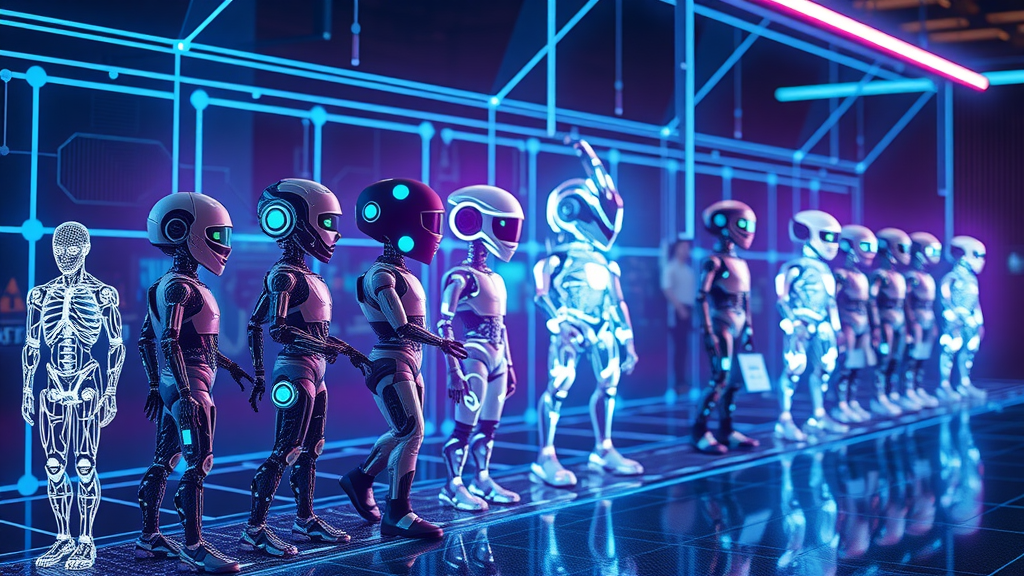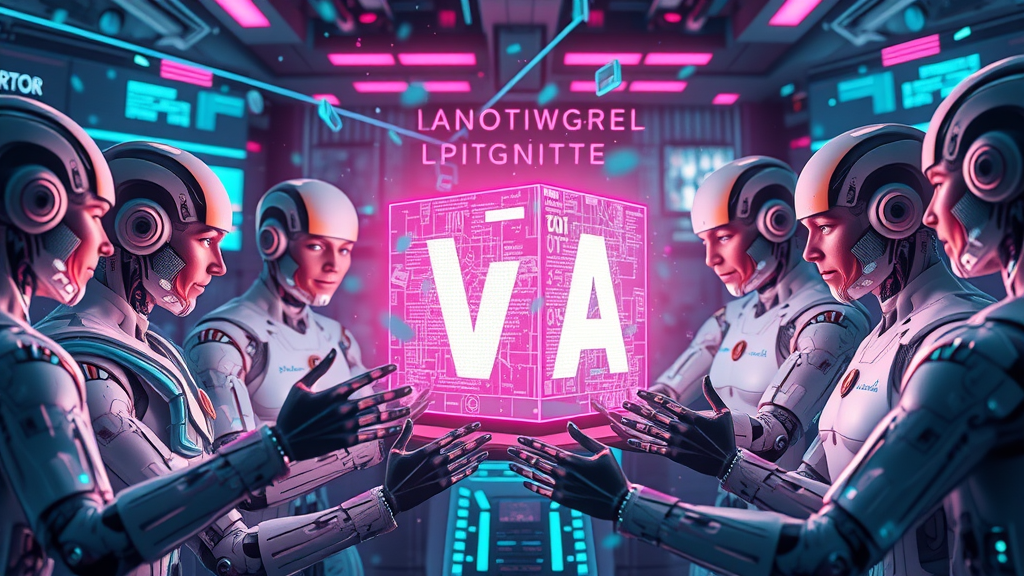Did you know? According to a recent survey, local businesses using intelligent agent frameworks for their marketing operations can outperform their competitors by up to 48% in lead conversion rates and campaign efficiency. Local business owners are discovering that “going agentic”—using AI-driven solutions for smarter automation—just might be the ultimate leap they need. This article dives deep into intelligent agent frameworks, shining a light on how they’re redefining marketing for local businesses, what you need to know to pick the right one, and how to put them to work for your success.
Revealing the Power of Intelligent Agent Frameworks: The Statistic Changing Everything
Intelligent agent frameworks are quietly becoming a game changer for small and local businesses eager to automate complex marketing and customer service tasks. With more than half of marketing leaders (51%, according to Forrester) planning to adopt agentic AI in the next year, it’s clear this isn’t just a tech fad—it’s a fundamental shift in how local businesses approach growth. By embracing agent frameworks, companies gain the power to personalize campaigns at scale, automate repetitive processes, and instantly analyze live data to spot new opportunities.
For local business owners, intelligent agent frameworks bring advanced AI agent capabilities into reach, helping them close the gap with big brands. The right agentic framework means you can scale outreach, predict customer behavior using large language models, and optimize conversions—often with less time and at lower costs than traditional automation tools. The bottom line? Businesses that invest now stand to multiply their marketing ROI and cement an edge in their community.

How Intelligent Agent Frameworks Are Transforming Modern AI Agents
Traditional AI agent tools for marketing often struggle to adapt to the ever-changing local landscape, but intelligent agent frameworks usher in a new era. These frameworks power smarter agent workflows—allowing autonomous agents to make decisions in real-time, personalize messages, and connect with marketing tools you already use. Instead of rigid, rule-based programs, today’s agentic AI leverages semantic kernel capabilities to understand natural language queries, create dynamic advertising content, and automatically respond to customer support requests without manual intervention.
The result? AI agents are no longer restricted to isolated tasks. From anticipating shopper needs in a physical store to launching targeted email campaigns based on weather or competitor activities, agent frameworks create intelligent agents that learn and adapt. For example, a local pizza shop could deploy a model-based agent to adjust its online deals in relation to city events or sports games—boosting impact with minimal human input. As these systems evolve, they continue absorbing data and refining their performance—offering perpetual improvement for local marketing teams.
What You'll Learn About Intelligent Agent Frameworks and Agentic AI
- The key components of intelligent agent frameworks
- How agentic frameworks and ai agent frameworks are reshaping marketing
- Real-world use cases for agent frameworks and ai agents in local business marketing
- Steps to evaluate and implement an effective agentic framework for your marketing campaign
- Expert views on the future of agent frameworks, agentic ai, and autonomous agents
Intelligent Agent Frameworks: Foundations, Evolution, and Key Concepts

Defining Intelligent Agent Frameworks, Agent Framework, and AI Agent
An intelligent agent framework is a technology backbone that empowers AI agents to work independently, coordinate actions, and handle complex workflows. At its core, an agent framework contains all the software rules, structures, and logic needed for AI agents to take actions, interact with other systems, and continuously learn. Think of it like the operating system, apps, and guides that tell each autonomous agent how to decide, what data to consume, and how to collaborate with other digital or human teammates.
What sets advanced ai agent frameworks apart is their focus on agentic AI—where multiple agent systems interact, reason, and adapt to new situations. Unlike legacy automation tools, agentic frameworks are able to process vast streams of unstructured data (like customer chats, emails, or social media posts), apply semantic kernel processing, and draw rich conclusions in real time. This transforms AI agents from simple, reactive bots into strategic, proactive teammates for your business.
What is an Agent Framework and How Do Agentic Frameworks Work?
An agent framework is like the skeleton and brain for any AI-driven solution. It provides the rules, communication protocols, and learning routines for ai agents. What makes agentic frameworks unique is their “self-driving” capability: they enable agents to set goals, understand context using natural language, and coordinate with other AI models and platforms, such as CRM or campaign tools.
Agentic frameworks leverage semantic kernel engines to give agents the nuance needed for local marketing—interpreting slang, managing schedules, and even resolving customer complaints automatically. By combining real-time analytics, machine learning, and robust decision-making, agentic AI frameworks allow businesses to automate in ways that are smarter and more flexible than anything before.
The Role of Agentic AI in Business: Autonomous Agents and Agent Workflows
In today’s landscape, agentic AI allows autonomous agents to handle everything from targeted ad buying to personalized customer support. By using agent workflows, these systems orchestrate actions across multiple platforms—whether that’s updating inventory after an online sale or triggering a social media campaign following a trending hashtag. This coordinated automation is a big leap beyond simple “if-then” rules. Instead, intelligent agents learn from data, adjust their tactics, and achieve business goals with minimal hand-holding.
For local businesses, the true strength of agentic AI lies in its adaptability. AI agent frameworks can integrate with marketing platforms, analyze behavior, and even adjust pricing based on seasonality or competition without human oversight. From retail shops to service providers, businesses can now offer higher-touch, consistent experiences at scale, freeing up time for staff to focus on relationship building or creative strategy.
A Brief History of AI Agents and the Growth of Agentic AI Frameworks
The journey of AI agents began in the 1980s with simple rule-based bots in computer games and networks. As technology matured, so did the ai agent frameworks—evolving from reactive, single-purpose programs into robust, learning-powered systems capable of advanced tasks. The introduction of semantic kernel processing in the last decade helped agents truly “understand” language and context, transforming them into essential business partners for everything from customer support to predictive marketing.
Today, the proliferation of agentic frameworks and large language models has democratized complex AI, putting powerful automation into the hands of local business owners. No longer limited by expensive, bespoke AI solutions, even small teams can deploy layered autonomous agent systems that outperform off-the-shelf marketing tools by learning and optimizing on the fly.
Types of Intelligent Agent Frameworks and Their Use Cases in Marketing

The 5 Types of Intelligent Agents and How Each Drives Local Marketing Success
- Simple Reflex Agents: These follow fixed ‘if-then’ rules—useful for sending automatic email confirmations or triggering coupon codes after a sale.
- Model-Based Reflex Agents: They keep track of past interactions, enabling more context-driven replies—like remembering a customer’s recent purchases to suggest related items.
- Goal-Based Agents: These agents evaluate different actions to achieve specific outcomes; think campaign managers that choose the best time to post promotions for max visibility.
- Utility-Based Agents: Focused on maximizing overall benefit, these select strategies based on what gives your business the most value—such as optimizing for both sales and customer satisfaction at once.
- Learning Agents: The most advanced, these agents gather new data, improve from mistakes, and continuously optimize results—ideal for businesses wanting AI tools that get smarter over time.
Each type brings a unique advantage to local marketing campaigns. By choosing the right agent setup, businesses can boost efficiency, personalize communication, and ensure their operations are always improving—even when staff is busy or offline.
Real-World Use Cases: Intelligent Agent Frameworks in Action
Let's explore how intelligent agent frameworks power winning marketing strategies in real businesses. Take a boutique retailer: by deploying a model-based reflex agent, they follow up with customers via SMS or email shortly after a purchase, improving return visits. Meanwhile, an automotive repair shop leverages a utility-based agent to schedule seasonal check-up reminders automatically—boosting both engagement and recurring revenue. Even learning agents can be found in action, such as in local cafes that use customer purchase data to develop and promote personalized meal offers—leading to stronger loyalty and increased sales.
Advanced frameworks bring even more value through seamless integration. For example, integrating large language models with agentic AI solutions lets local businesses create content and campaigns uniquely tailored to their neighborhood’s conversations, weather, and events. This localized, dynamic marketing outpaces generic automation—delivering timely offers that customers notice and appreciate.
| Feature | Intelligent Agent Framework | Traditional Tool |
|---|---|---|
| Personalization | Dynamic, context-aware, learns customer preferences | Limited, often static |
| Workflow Automation | Complex, multi-step, adaptive workflows | Basic “if-then” rules |
| Integration | Plug-and-play with various platforms (social, CRM, POS) | Often siloed, requires manual setup |
| Learning & Optimization | Continuous learning and improvement | Manual adjustments required |
| Cost Efficiency | Saves time and reduces overhead | Labor intensive, higher long-term costs |

Choosing the Right Agentic Framework for Your Local Business
Best Frameworks: How to Choose the Right Agent Framework for AI Agents
When selecting an agent framework, start by identifying your business needs: do you need simple automation, or are you aiming for full-scale personalization? Next, review frameworks with robust integration capabilities (can it work with your CRM or POS?) and look for modularity, so you can start small and scale up as you grow. It’s also smart to assess the learning capabilities (like support for large language models), security measures, and local support resources. Aim for ai agent frameworks known for fast adaptation to changing data and customer trends—this flexibility gives you a major local edge.
Many local business owners find that frameworks which allow for easy workflow customization, strong analytics, and reliable security hit the sweet spot—balancing cutting-edge power with ease of use. The best frameworks in this category don't just automate—they enable truly agentic AI to drive marketing effectiveness, customer connection, and real business results.
Top AI Agent Frameworks Local Businesses Should Consider
- LangChain
- Autogen
- Microsoft Semantic Kernel
- CrewAI
- Haystack
- Custom agentic AI solutions
Each framework comes with strengths, from seamless semantic kernel integration to rapid workflow configurability. Key is choosing the option that fits with your marketing toolkit and local market.
Agent Workflow Optimization and Integration: Best Practices
Optimizing agent workflows boils down to clarity and flexibility. Start by mapping your marketing processes, then work with the framework to define workflows—such as email drip campaigns, automated customer texting, or dynamic ad creation. It’s important to regularly review workflow data, identify bottlenecks, and tweak your agentic framework settings for continual improvement. Don’t forget about training—both for the agents and your team—to ensure everyone gets the full benefit from the new system.
Integration is another key step. Top frameworks integrate seamlessly with platforms like Shopify, Mailchimp, and major CRMs, letting agentic AI drive initiatives like hyper-personalized email or social campaigns triggered by real-world events and customer actions. By designing workflows that anticipate customer needs, you put your business one step ahead—and keep those marketing results climbing.
Integrating Large Language Models into Agent Workflows for Hyper-Local Marketing
The ability to combine large language models with agent workflows is a game-changer for local marketing. These integrations empower your business to create content, answer customer questions, and launch new campaigns—all in natural language and with true local nuance. Want to send out a neighborhood-specific promotion? Your agentic AI will craft—and deploy—content tailored to local slang, interests, and current events, making every outreach more effective.
“Intelligent agent frameworks are redefining how local businesses harness automation, personalize outreach, and drive measurable growth.”—AI Marketing Expert

Key Features to Look for in Advanced Intelligent Agent Frameworks
Core Components of Agent Frameworks, Agentic Frameworks, and AI Agent Frameworks
- Modularity and extensibility: Ability to add new features and AI agents as your business grows.
- Semantic kernel capabilities: Enables nuanced understanding and processing of natural language data from customers.
- Easy integration with marketing platforms: Seamless connectivity with CRM, POS, email, and social media tools.
- Robust agent workflow management: Simple UI for building, monitoring, and optimizing agent workflows.
These features ensure your chosen solution is future-proof, flexible, and powerful enough for both today’s campaigns and tomorrow’s opportunities.
Overcoming Common Challenges When Deploying Intelligent Agent Frameworks
Launching intelligent agent frameworks is not without challenges—especially around configuration, team adoption, and maximizing ROI. To minimize friction, start with a clear business problem, engage your marketing team early, and offer ongoing training. Always run pilot programs before full rollout, and use built-in analytics to monitor workflow performance, learn quickly, and iterate fast. Don’t underestimate the value of a framework with supportive documentation and active community forums.
Security, compliance, and data privacy are also major concerns—especially when customer data is central. Prioritize frameworks with end-to-end encryption, strong privacy controls, and proven reliability, so you can confidently deploy agentic AI solutions while maintaining trust.
Security, Data Privacy, and Reliability in Agentic AI
No matter how advanced your agentic AI solution, customer trust comes first. Make sure your chosen agentic framework meets top security standards, such as SOC 2 or GDPR. Look for features like encrypted communications, role-based access, and detailed audit logs. Reliability—meaning the system is up, accurate, and fast—is also key; downtime means lost revenue and damaged relationships. Check for proven uptime records, frequent security updates, and real-world testimonials.

Step-by-Step Guide: Getting Started with Agentic AI and Agent Frameworks
How to Get Started with Intelligent Agent Frameworks for Your Marketing Needs
Ready to turn the promise of intelligent agent frameworks into results? Here’s a simple, proven path:
- Assess your marketing pain points: Pinpoint where your team spends excessive time, or where customer experience falls short.
- Select an appropriate agentic framework: Match your needs to solutions with the right mix of features, integration, and local support.
- Implement and configure your intelligent agent framework: Map out priority workflows, set up key integrations, and start automating high-impact tasks.
- Monitor agent workflows and adjust campaigns: Use built-in analytics to optimize results—tweaking workflows, prompts, or target segments as needed.
- Measure ROI and optimize using language models: Analyze early wins, fine-tune agent responses, and leverage large language models for ever-better local marketing performance.
Tip: Start small with a single workflow (such as automated review requests) before scaling across your marketing stack.

Intelligent Agent Frameworks, Large Language Models, and the Future of AI in Local Marketing
The Role of Language Models and Autonomous Agents in Agentic Frameworks
Modern intelligent agent frameworks are powered by ground-breaking large language models. These models enable AI agents to understand customer conversations, create on-brand content, and personalize offers with a level of nuance never before possible in local marketing. Autonomous agents built on these frameworks can source, curate, and launch campaigns based on regional trends, customer mood, and even local news—putting big-brand power into the hands of small business owners.
As these tools evolve, expect agentic frameworks to offer voice and chat support, cross-platform integration, and context-aware recommendations powered by real-time AI system learning. This is more than just automation—it’s true digital intelligence, working alongside you to achieve marketing goals, delight customers, and increase profitability.

Emerging Trends: Agentic Frameworks, Semantic Kernel, and Agent Systems
The future of agentic frameworks is being shaped by rapid innovation in semantic kernel technology and hybrid agent systems. Local businesses can expect to see deeper contextual understanding, with agent workflows that factor in everything from microclimates to neighborhood events to individual customer interests. This enables real-time adaptation, granular personalization, and new revenue streams for those leveraging the latest AI agent framework tech.
Keep an eye on trends like multi-agent orchestration (different AI agents collaborating on one workflow), intelligent cross-platform recommendations, and no-code agentic AI builder tools—lowering the barrier for anyone to deploy next-generation automation.
People Also Ask About Intelligent Agent Frameworks
What are the 5 types of intelligent agents?
The five types are Simple Reflex Agents (follow direct rules), Model-Based Reflex Agents (use memory for context), Goal-Based Agents (plan to meet targets), Utility-Based Agents (choose the best value option), and Learning Agents (improve with new info). Each has unique use cases in local business, from basic automations to advanced, data-driven strategies that evolve over time.
Simple, Model-Based, Goal-Based, Utility-Based, and Learning Agents Explained

What is the best framework for AI agents?
The “best” ai agent framework depends on your local business’s needs. Top choices include LangChain, Microsoft Semantic Kernel, and CrewAI for their integration, modularity, and advanced semantic capabilities. Custom frameworks may be preferred if deep-local customization or industry-specific features are required.
Evaluating Leading AI Agent Frameworks for Local Businesses
What are the 4 types of AI agents?
The four classic types are Reflex Agents, Model-Based Agents, Goal-Based Agents, and Utility-Based Agents. Each addresses different business automation needs, from simple triggers to strategic optimization.
A Closer Look at Reflex, Model-Based, Goal-Based, and Utility-Based Agents
What are AI frameworks?
AI frameworks are structured sets of tools, libraries, and rules that allow developers to build, deploy, and manage artificial intelligence systems, including agents. Modern AI frameworks like PyTorch, TensorFlow, and agentic frameworks offer the building blocks for natural language processing, workflow automation, and adaptive business solutions of all types.
Understanding the Foundations and Applications of AI Frameworks
FAQs on Intelligent Agent Frameworks, Agentic AI, and Agent Frameworks
-
How do intelligent agent frameworks differ from classic automation?
Intelligent agent frameworks use AI to learn, adapt, and personalize over time, while classic automation follows static “if-then” rules. Agentic frameworks handle more complex, multi-step workflows and can personalize at scale. -
Can agentic frameworks scale with business growth?
Absolutely—they are designed to accommodate increased data, workflows, and users. As your business grows, you can add new AI agents and tasks without rebuilding your system from scratch. -
Are agentic AI and autonomous agent systems safe for customer data?
Yes, provided you choose frameworks with robust encryption and privacy controls. Always verify the provider’s security compliance before integrating sensitive data. -
Which marketing platforms integrate with leading intelligent agent frameworks?
Top frameworks typically support integration with platforms like Shopify, HubSpot, Mailchimp, Salesforce, and custom APIs. Always check supported integrations before making your decision.
Key Takeaways for Local Businesses Using Intelligent Agent Frameworks
- Intelligent agent frameworks bridge automation and personalization in modern marketing.
- Adopting agentic frameworks can drastically reduce costs and increase efficiency for local businesses.
- Choosing the right agent framework hinges on integration needs, workflow design, and targeted campaigns.
- Future agentic AI solutions will be driven by adaptive learning and advanced language models.

Final Thoughts: Are Intelligent Agent Frameworks the Breakthrough for Local Marketers?
“The future of marketing belongs to businesses that embrace intelligent agent frameworks and agentic AI to personalize and automate at scale.”
In short: Investing in the right intelligent agent framework now gives your local business the power to compete, connect, and grow in ways never before possible.
We'd love to hear what you think about this? Please add your comments below...
To enhance your understanding of intelligent agent frameworks and their applications, consider exploring the following resources:
-
“AI Agent Frameworks - GeeksforGeeks”: This article provides an overview of various AI agent frameworks, detailing their core components and functionalities. It discusses how these frameworks facilitate the development of intelligent agents capable of sensing, reasoning, and acting within their environments. The piece also highlights the significance of learning and adaptation, communication protocols, and environment interfaces in building effective AI agents. (geeksforgeeks.org)
-
“Top AI Agent Frameworks in 2025: Features, Comparisons & Use Cases”: This comprehensive guide examines leading AI agent frameworks as of 2025, comparing their features and discussing practical use cases. It delves into frameworks like OpenAI Swarm and Microsoft Semantic Kernel, explaining their functionalities and how they can be leveraged to build sophisticated AI agents. The article also provides insights into the integration of large language models and the orchestration of multi-agent systems. (signitysolutions.com)
By exploring these resources, you’ll gain a deeper understanding of intelligent agent frameworks, their components, and how they can be applied to enhance local business marketing strategies.
 Add Row
Add Row  Add
Add 










Write A Comment